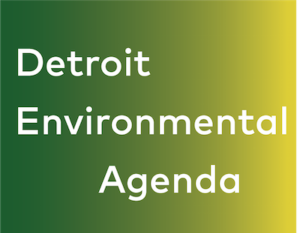Kiawana Brown
Candidate for Mayor

Q: Where can people go to learn more about your biography? If not readily available online, please describe in 150 words or less, your relevant experience, public offices held (if any), involvement in environmental causes, and membership in any environmental organizations. If you currently hold office, describe any votes or actions demonstrating concern for the environment.
A: https://brownthepeoplesmayor.com/about/
Community
Q: If elected, how will you work with Detroit residents to ensure that they benefit from and partake in the decision-making surrounding local development projects and that potential adverse impacts of those projects are identified, measured, monitored and mitigated? Moreover, how would you work to put more power into the hands of residents to maintain and revitalize their own communities and to access vacant land through the DLBA?
A: The people’s voice is always important in decision-making concerning our communities, especially concerning the areas they live, work and play in. I would ensure that we seek the counsel and input of our residents through surveys, open forums, community meetings etc. Furthermore, take their ideas and use them during implementation. I’d also like to see local businesses giving a portion of their proceeds to the communities they do business in. The proceeds would help with financial assistance for youth recreation, low-income families, and/or community revitalization. Through my community revitalization initiative, I’d like to empower the residents to be more involved in revitalizing their own communities. I would do so through education, tools, and resources to equip the residents to become more involved and self-sufficient. Also, we would give residents an opportunity FIRST to purchase the vacant land in their communities.
Q: If elected, what budget appropriations would you propose to increase investment in needed social and environmental services to help improve the quality of life and health of Detroit residents?
A: I would allocate a portion of funding from the American Rescue Plan to go towards social and environmental services. These issues are on-going issues in our city. Statistically, it is known that urban cities, especially those of color, suffer from severe environmental issues. This is a problem that we must do our due diligence on resolving. We can do so much through education, accountability, and proper funding. We can solicit federal, local, and state funds to combat this war on our environment. For example, we can access funding through the Environmental Justice Small Grants (EJSG) Program.
Public Health
Q: What long-term solutions do you see for addressing vehicle speeds and making our streets safer?
A: An alarming amount of people die in car crashes on an annual basis. Especially, in or near urban cities. It’s projected that by 2030 that it will be the fifth leading cause of death, so there is certainly a need for safer streets in our urban city. Some of the things that we can do to combat this issue is design safer streets: continue installing speed bumps, install more bike lanes for bicyclists, increase walk-ability, and improve overall access to mass transport. Additionally, we can improve visibility around cross-walks by enhancing lighting.
Q: How will you work to reduce the negative health impacts of air quality on the residents of Detroit?
A: In order to reduce the negative health impacts of air quality on the residents of Detroit we must tackle the root cause of it, which is poor air quality. We have to work on creating healthier air quality. There are a number of ways we can do so, I’ll list a few: raise awareness through education, promote mass transit, plant vegetative buffers in neighborhoods to reduce air pollution, and hold businesses accountable for implementing green practices.
Q: If elected, what actions will you take to work toward safer, healthier, and more affordable housing for all Detroiters?
A: Detroit has been in an ongoing housing crisis for years. Gentrification and spiked rental prices are contributors to our current housing crisis. As we tear down blighted properties and rebuild, we must ensure that we are building affordable housing for our low income families. Also, we must build on good soil. As we renovate salvageable ones, we must ensure that we are checking for and getting rid of asbestos, lead in water and in paint, and black mold. Also, we need to rid current occupants of these issues as well. Another issue we have is overpriced senior living housing; we have to ensure affordable housing for our seniors.
Energy
Q: What are your priorities to reduce emissions and lessen the impacts of climate change in Detroit during your term in office?
A: My priorities to reduce and lessen the impacts of climate change in Detroit are to collaborate with organizations like Detroit Environmental Agenda to ensure that we are aggressively attacking these issues. Also, support Detroit City Council in their efforts to reduce emissions by passing various ordinances. Additionally, I will work on transitioning our city to low carbon energy and implement a plan to phase out all greenhouse gas emissions over a period of time. Also, replace fossil fuel usage with renewable energy and convert to widespread electric use.
Q: What are your plans for helping the city transition to renewable energy and how will you ensure that the cost benefits and increased resilience that come from the use of renewables is made accessible to low-income and vulnerable communities across Detroit?
A: First, we have to identify a strategy on how we would make the transition to renewable energy. There are various types of renewable energy such as: hydro-thermal, wind, solar and tidal. Out of the different types of renewable energy, it has been proven that solar energy is the most efficient and effective renewable energy source, especially for home and commercial use. Using solar energy we could implement these renewable energy transaction structures: on-site solar and community solar. As we transition to renewable energy, we can offer government energy subsidies to make it affordable for low-income and vulnerable communities.
Recycling
Q: How can the city increase recycling, composting, and the use of post-consumer recycled materials, while addressing the city’s litter and illegal dumping problem?
A: Awareness is key to increase recycling, composting, and the use of post-consumer recycled materials. As we raise awareness of the aforementioned through adequate and consistent education, we will see an increase in these areas. Also, we can partner with companies who promote these initiatives to assist them in aiding our communities. Similarly, we must do the same for addressing the city’s litter and illegal dumping problem; we must raise awareness through ongoing education. Also, issue warnings, then citations to businesses and residents for non-compliance. Increase fines for litter and illegal dumping. Install surveillance cameras in areas that are hot spots for illegal dumping. Additionally, we can work with law enforcement to hire personnel that would focus on illegal dumping investigations & enforcement.
Jobs
Q: What steps would you take to prepare the local workforce to take advantage of and be part of the movement toward a green economy, through qualifying for good paying infrastructure and clean energy jobs, amongst others?
A: As we move towards becoming a green economy, it is imperative that we prepare our local workforce to qualify and be employable for such jobs. There are a few things we can do to prepare for this: partner with green companies that offer workforce training, offer certifications and apprenticeships, encourage local workforce to go back to school for green programs to retool themselves, career centers that specialize in green job readiness, and offer local job fairs that focus on green jobs.
Water
Q: How will you ensure that clean water is accessible and affordable to all Detroiters?
A: I would ensure that clean water is accessible to all by investing money to rebuild our infrastructure and do regular routine quality control checks of our water to ensure it is safe and clean. Also, I would implement a water subsidy program for low-income families, which would allow their water rates to be adjusted to their affordability.
Q: How will you help municipal agencies and property owners integrate Green Stormwater Infrastructure (GSI) across the city to manage stormwater and reduce drainage charge fees for property owners?
A: I will help municipal agencies and property owners integrate GSI across the city by getting funding from federal, state and local levels to assist with implementation of GSI. Also, solicit grant funding from sources like the EPA Urban Waters Small Grants and the HUD Community Development Block Grant Program to aid us in this matter. Some of the things we already have in place and will continue in are- downspout disconnections, demolition and removal of vacant structures, bioswales along roadways and parking lots, and partner with organizations like Greening of Detroit to plant trees.
Optional
Q: Please identify the top environmental concerns to you personally, identify the environmental issue in your community that is the most pressing, and what you would like to do as an elected official to address this most pressing concern.
A: My top environmental concerns are safe housing, air quality, greenhouse gases, recycling and littering. The environmental issue in my community that is most pressing is high energy use. As an elected official, I will work on implementing the use of solar energy, installing solar panels on homes and businesses.

